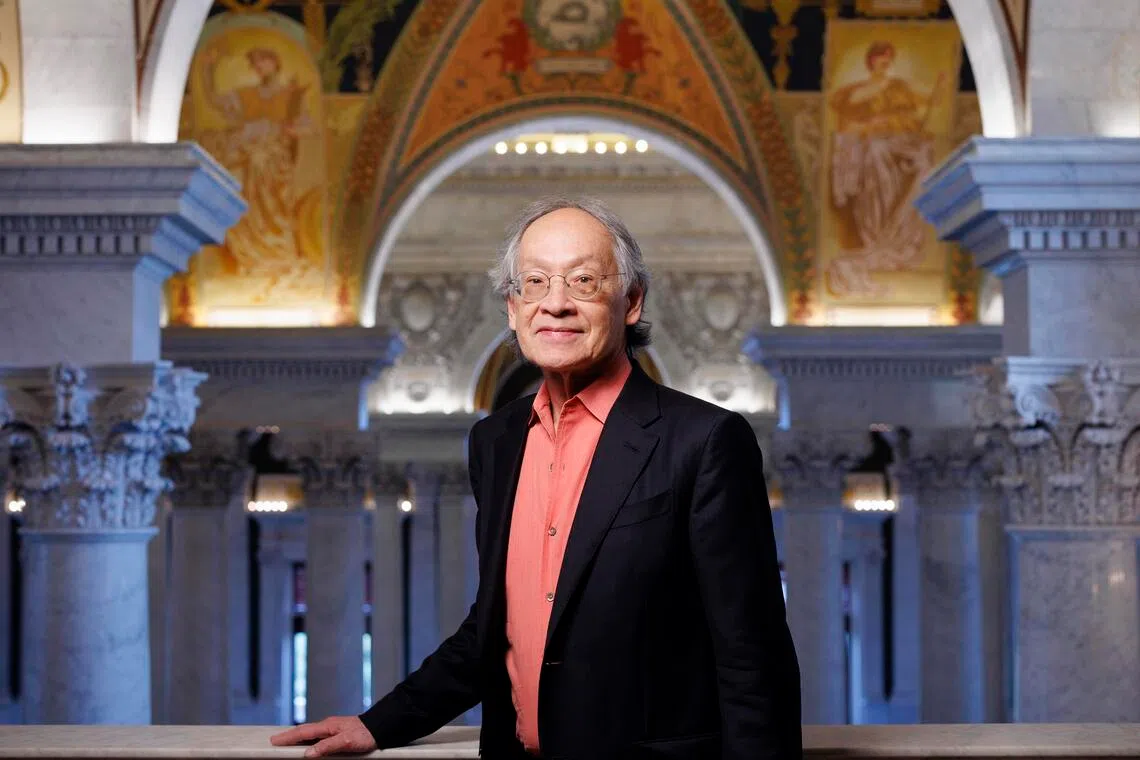Second-generation Chinese-American Arthur Sze, 74, will be next US poet laureate
Sign up now: Get ST's newsletters delivered to your inbox

New US poet laureate Arthur Sze, at the Library of Congress in Washington, is an observational poet whose work is grounded in nature and imagery.
PHOTO: SHAWN MILLER/NYTIMES
Elizabeth A. Harris
Follow topic:
NEW YORK – Arthur Sze was a freshman at the Massachusetts Institute of Technology (MIT), taking notes during a calculus lecture, when he suddenly stopped listening.
He flipped to the back of his notebook and wrote down a couple of phrases. That night, in his dorm room, those scribbles became his first poem.
The following year, he left MIT, transferring to the University of California, Berkeley, and telling his parents he wanted to become a poet. They were not pleased.
His bet on himself, however, has paid off. The Library of Congress announced on Sept 15 that Sze, 74, will be the next poet laureate of the United States.
The second-generation Chinese American is an observational poet, whose work is grounded in nature and imagery.
He said he first learnt his craft by translating ancient Chinese poems. Over time, his poems grew longer, often made up of numbered sequences that changed perspective and tone from one section to another.
His newer poems look simpler, but hopefully, he said, they are deeper.
“When you read a poem, you don’t need to feel like you get it all at once,” Sze said. “The best poems communicate through sound and rhythm and musicality. And as you read and reread, the poem emerges.”
Into The Hush, his most recent collection, was published in 2025.
In a poem called Farolitos, Sze begins with an image of pouring sand into brown paper lunch bags, then placing a votive candle in each one:
in this life, you may try, try
to light a match, fail,
fail again and again; yet, letting go, you strike
a tip one more time
when it bursts into flame –
Born in New York City to immigrants from China (his father had a doctorate in chemical engineering from MIT), Sze has lived most of his life in New Mexico, where he taught at the Institute of American Indian Arts for more than two decades.
As poet laureate, he said he plans to focus on poetry that has been translated into English from other languages.
Sze will be the 25th poet laureate of the US, following writers including Joy Harjo, Tracy K. Smith, Juan Felipe Herrera and, most recently, Ada Limon.
Sze has won a National Book Award, been a finalist for a Pulitzer Prize and received fellowships from the Guggenheim Foundation and National Endowment for the Arts.
He takes over as poet laureate at a particularly contentious moment in American culture. In May, US President Donald Trump fired the librarian of Congress, Ms Carla Hayden, over her support for diversity initiatives.
Unlike writing by Smith and Harjo, among others, Sze’s work does not focus on identity. He said the choice to write in a particular language can be a political decision, but he believes that didactic poetry – work that tries to tell people to do one thing or another – often falls flat.
“Poetry communicates best through its humanity,” he said. “If you make the reader experience what’s going on, they can decide for themselves,” he continued. “I like to say poetry must resist all forms of coercion.”
Sze said that when he received a call from the Library of Congress offering him the role of poet laureate, he asked for a little time to consider it.
“I said, ‘This is really great, but I want to think it over,’” he said. “I wanted to make sure it was not a political appointment in any way. I also wanted to think about, well, am I going to have any time for my own writing?”
By the morning, he said, he had decided to accept the position.
“I want to keep it focused on its goal,” he added, “which is to recognise, celebrate and appreciate the power of poetry. I feel like if I can do that, that’s plenty.” NYTIMES

